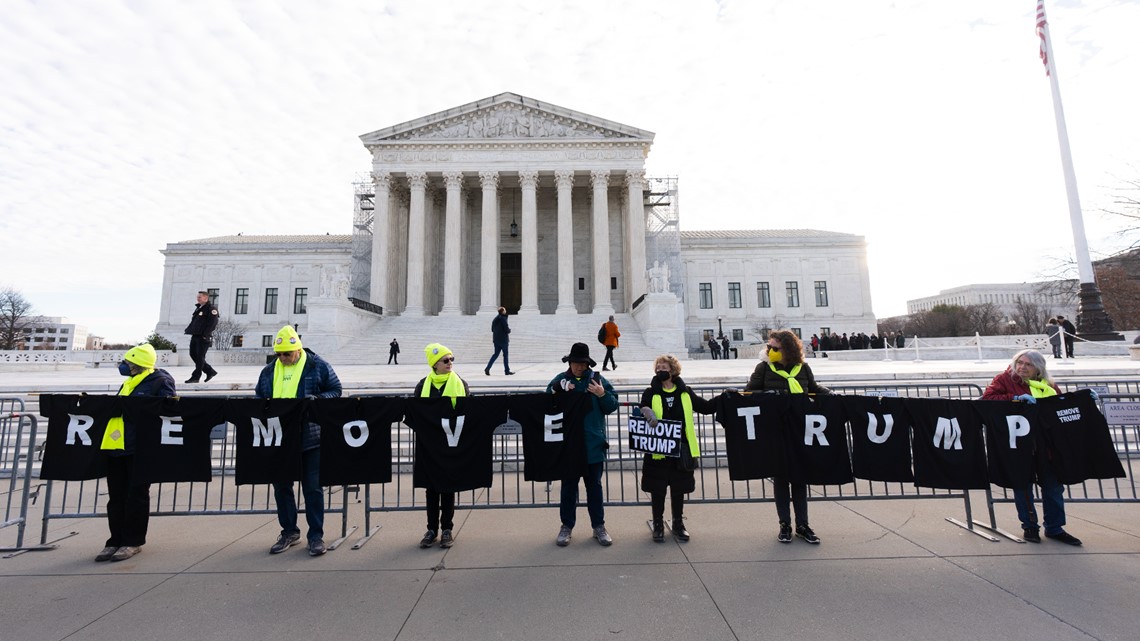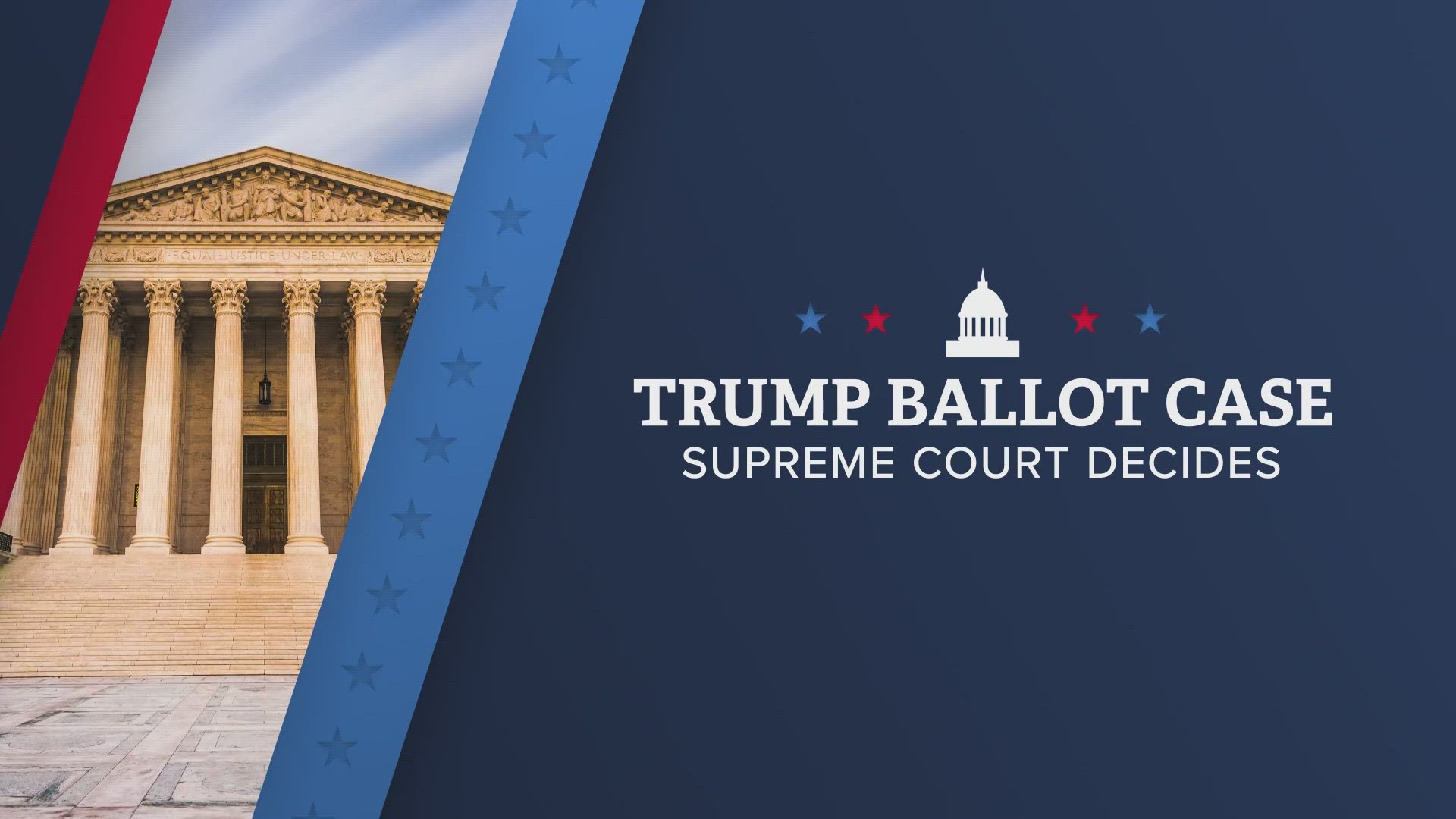WASHINGTON — The U.S. Supreme Court heard more than two hours of arguments Thursday morning over whether former President Donald Trump can be excluded from Colorado's presidential primary ballot.
The Colorado Supreme Court ruled in December that Trump incited a riot in Washington, D.C., on Jan. 6, 2021, in violation of the 14th Amendment.
That constitutional provision was adopted after the Civil War to prevent former officeholders who “engaged in insurrection” from holding office again. As a result, Trump should not be on the ballot for the state’s primary on March 5, the state court ruled. It was the first time that Section 3 of the 14th Amendment was applied to a presidential candidate.
A key portion of the argument of Johnathan Mitchell, who represents Trump in these proceedings, is that Trump, as president, was not an "officer of the United States."
"Officer of the United States refers only to appointed officials, and it does not encompass elected officials such as the president or members of Congress," Mitchell said. "The president doesn't commission himself, and he can't commission himself."
Mitchell argued that Congress alone should have the ability to determine a candidate's amnesty or disqualification through a two-thirds majority vote because they can overrule if a candidate is disqualified by Section 3.
"Congress can lift that disability after the candidate is elected, but before he takes office," Mitchell said.
He argued that enforcing Section 3 against a one-term president violates term limits. He also contended that Jan. 6 wasn't an insurrection, and even if it was, he argued that Trump did not incite or participate in an insurrection.
He also argued that a state disqualifying a candidate was essentially adding an additional requirement to the presidency, which would be unconstitutional.
Supreme Court justices asked about the potential fallout if states are allowed to remove candidates from ballots based on Section 3, such as states disqualifying members of certain parties in retaliation, which could lead to just a handful of states deciding a presidential election.
There were also concerns raised that one state being able to remove a candidate would effectively decide for other states. Justice Elana Kagan asked "why a single state should decide who gets to be president of the United States.”
Chief Justice John Roberts echoed similar concerns that partisan politics could come into play if the court upholds the state court's ruling and that “surely some of those will succeed.”
There were also questions raised about whether Section 3 applies to the presidency, as neither that office nor the vice presidency appear in the list of offices included in the constitutional amendment.
Lawyer Jason Murray, representing the Colorado voters who brought the case, argued that based on discussions in Congress at the time the 14th Amendment was debated and enacted, it was understood that the presidency and vice presidency were included.
He argued that the spirit of Section 3 was to prevent charismatic former Confederates from rising in power, up to and including the presidency. He specifically mentioned that Jefferson Davis, who was president of the Confederacy, was in the mind of Congress as it was considering Section 3.
Justice Ketanji Brown Jackson implied that her interpretation of the 14th Amendment and historical record was that it was focused on the infiltration of the state apparatus by insurrectionists, and not focused on federal offices like the presidency.
When asked about concerns that a ruling supporting the lower court's decision to remove Trump from the ballot would lead to partisan reprisal, Murray and Shannon Stevenson, arguing on behalf of the Colorado Secretary of State's Office, both said that there needs to be faith in the state apparatuses to determine that based on the court's directive, as well as the narrow definition of what an "insurrectionist" is.
"We're here so this court can give us nationwide guidance on some of the legal principles that are involved," Stevenson said. "We have to have faith in our system that people will follow their election processes appropriately, that they will take a realistic view on what an 'insurrection' is under the 14th Amendment. Courts will review those decisions, this court may review some of them, but I don't think the court should take those threats too seriously.
Regardless of the ruling, Trump's name will appear on primary ballots because of printing deadlines. If the U.S. Supreme Court upholds Colorado's ruling, votes for Trump cannot be counted.
An audio stream can be heard in the video below:
Trump's lawyers argue that the amendment can't be used to keep Trump off the ballot for several reasons.
For one thing, they contend the Jan. 6 riot wasn't an insurrection, and even if it was, Trump did not participate. The wording of the amendment also excludes the presidency and candidates running for president, they say. Even if they're wrong about all of that, they argue that Congress must pass legislation to reinvigorate Section 3.
The lawyers for Republican and independent voters who sued to remove Trump's name from the Colorado ballot counter that there is ample evidence that the events of Jan. 6 constituted an insurrection and that Trump incited it. They say it would be absurd to apply Section 3 to everything but the presidency or that Trump is somehow exempt. And the provision needs no enabling legislation, they argue.
A definitive ruling for Trump would largely end efforts in Colorado, Maine and elsewhere to prevent his name from appearing on the ballot.
A decision upholding the Colorado decision would amount to a declaration from the Supreme Court that Trump did engage in insurrection and is barred by the 14th Amendment from holding office again. That would allow states to keep him off the ballot and imperil his campaign.
The court last played so central a role in presidential politics in its 5-4 decision that effectively ended the disputed 2000 election in favor of George W. Bush.
Justice Clarence Thomas is the only member of the court who also took part in Bush v. Gore. Thomas has ignored calls by some Democratic lawmakers to step aside from the case because his wife, Ginni, supported Trump’s effort to overturn the 2020 election results and attended the rally that preceded the storming of the Capitol by Trump supporters.
The justices could opt for a less conclusive outcome, but with the knowledge that the issue could return to them, perhaps after the general election in November and in the midst of a full-blown constitutional crisis.
Trump is separately appealing to state court a ruling by Maine’s Democratic secretary of state, Shenna Bellows, that he was ineligible to appear on that state’s ballot over his role in the Capitol attack. Both the Colorado Supreme Court and the Maine secretary of state’s rulings are on hold until the appeals play out.
The court has signaled it will try to act quickly, dramatically shortening the period in which it receives written briefing and holds arguments in the courtroom.
People began lining up outside the court on Wednesday hoping to snag one of the few seats allotted to the public. “This is a landmark decision and I want to be in the room where it happened, to quote ‘Hamilton,’” said Susan Acker of Cincinnati, Ohio, who was in line with two friends.


The issues may be novel, but Trump is no stranger to the justices, three of whom Trump appointed when he was president. They have considered many Trump-related cases in recent years, declining to embrace his claims of fraud in the 2020 election and refusing to shield tax records from Congress and prosecutors in New York.
Before the Supreme Court is even finished deciding this case, the justices almost certainly will be dealing with another appeal from Trump, who is expected to seek an emergency order to keep his election subversion trial on hold so he can appeal lower-court rulings that he is not immune from criminal charges.
In April, the court also will hear an appeal from one of the more than 1,200 people charged in the Capitol riot. The case could upend a charge prosecutors have brought against more than 300 people, including Trump.
> Watch 9NEWS original shows, live Colorado news and weather updates, daily forecasts, and sports coverage for free on the 9NEWS+ app on Roku and Fire TV.
SUGGESTED VIDEOS: Politics
9NEWS+
9NEWS+ has multiple live daily shows including 9NEWS Mornings, Next with Kyle Clark and 9NEWS+ Daily, an original streaming program. 9NEWS+ is where you can watch live breaking news, weather updates, and press conferences. You can also replay recent newscasts and find videos on demand of our top stories, local politics, investigations and Colorado specific features.
To download 9NEWS+ on Roku search for KUSA.
To download 9NEWS+ on Fire TV search for 9NEWS.

